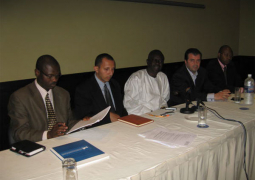The new United Nations Development Assistance Framework (UNDAF) 2012-2016 was yesterday unveiled with key priorities set on poverty reduction and acceleration of economic growth; enhancing social services and strengthening good governance and human rights.
According to the UNDAF, across these priorities, the United Nations Country Team will focus its technical support, resources and advocacy to make tangible contributions to eight outcomes, which it said are critical institutions and behavioral changes that will help to achieve national development goals and related MDGs.
The operational framework that guides the work of all UN agencies in alignment with the national vision and development priorities, the UNDAF was launched at the Atlantic Hotel, which also saw the review of the UNDAF 2007-2011.
UNDAF 2012-2016, among others, outlines the strategic direction and results expected from cooperation between the Gambia government and the United Nations Country Team for the period 2012-2016.
UNDAF represents a collective response of the UN system to the national development priorities as per the MDG goals and the draft PAGE 2012-2015, as well as Vision 2020 document.
Guided by The Gambia’s development challenges and the identification of the Government’s national priorities and strategies, UNDAF also reflects The Gambia’s changing economic, social and environmental conditions.
In its country situation and outlook section, UNDAF noted that The Gambia has over the last few years experienced steady growth and macroeconomic stability with real GDP expected to be around 5.5 percent in 2012.
It also noted that strong growth in agriculture, largely due to good rains and successful expansion of rice farming, impacted positively on economic growth.



